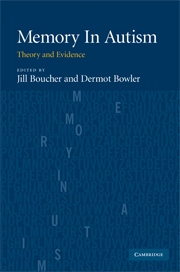Book contents
- Frontmatter
- Contents
- List of tables
- List of figures
- List of contributors
- Foreword
- Preface
- Part I Introduction
- Part II The neurobiology of memory in autism
- 2 Temporal lobe structures and memory in nonhuman primates: implications for autism
- 3 Acquired memory disorders in adults: implications for autism
- 4 A comparison of memory profiles in relation to neuropathology in autism, developmental amnesia and children born prematurely
- 5 Possible parallels between memory and emotion processing in autism: a neuropsychological perspective
- 6 Dysfunction and hyperfunction of the hippocampus in autism?
- Part III The psychology of memory in autism
- Part IV Overview
- Index
3 - Acquired memory disorders in adults: implications for autism
Published online by Cambridge University Press: 05 November 2009
- Frontmatter
- Contents
- List of tables
- List of figures
- List of contributors
- Foreword
- Preface
- Part I Introduction
- Part II The neurobiology of memory in autism
- 2 Temporal lobe structures and memory in nonhuman primates: implications for autism
- 3 Acquired memory disorders in adults: implications for autism
- 4 A comparison of memory profiles in relation to neuropathology in autism, developmental amnesia and children born prematurely
- 5 Possible parallels between memory and emotion processing in autism: a neuropsychological perspective
- 6 Dysfunction and hyperfunction of the hippocampus in autism?
- Part III The psychology of memory in autism
- Part IV Overview
- Index
Summary
Introduction
Memory can be impaired by brain damage at any age. Developmental memory disorders can result from genetic factors or genetic/environmental interactions which prevent the brain from developing normally; or from early-acquired brain lesions. Developmental memory problems are likely to resemble adult memory problems with respect to specific deficits in information processing that depend on dedicated brain structures where there is little scope for transfer of function, as may be true of the medial temporal lobes (MTL) (Bachevalier, this volume, Chapter 2).
The effects of developmental memory problems are, however, likely to differ from the effects of adult-acquired memory problems in several ways. On the one hand, they may have a cumulative effect in so far as they slow or prevent the acquisition of knowledge critical for the development of social skills, language and crystallized intelligence. As a result, developmental memory problems may produce much more severe social, linguistic and cognitive disruption than adult memory problems, as appears to be the case in infant-lesioned as opposed to adult-lesioned primates (Bachevalier, this volume, Chapter 2). Conversely, early-acquired disorders could allow the acquisition of better compensatory strategies and coping skills than occurs in adult-acquired disorders. Also, if a structure has never been functional or even present, other brain structures will not have to adapt to working with it and then without it, so that their functioning may be more optimal.
- Type
- Chapter
- Information
- Memory In AutismTheory and Evidence, pp. 43 - 62Publisher: Cambridge University PressPrint publication year: 2008
- 6
- Cited by



